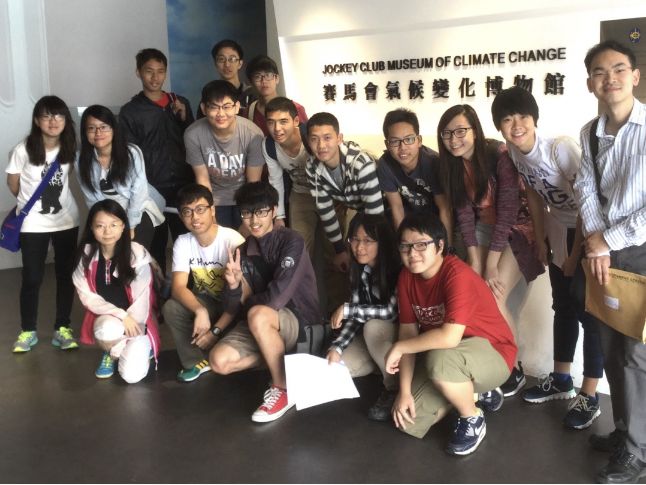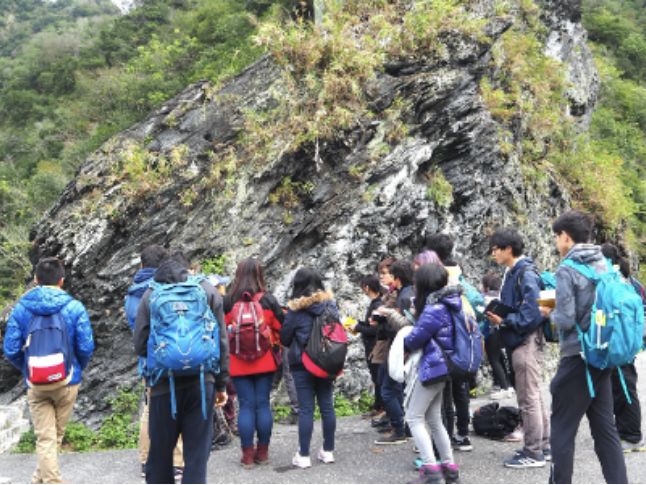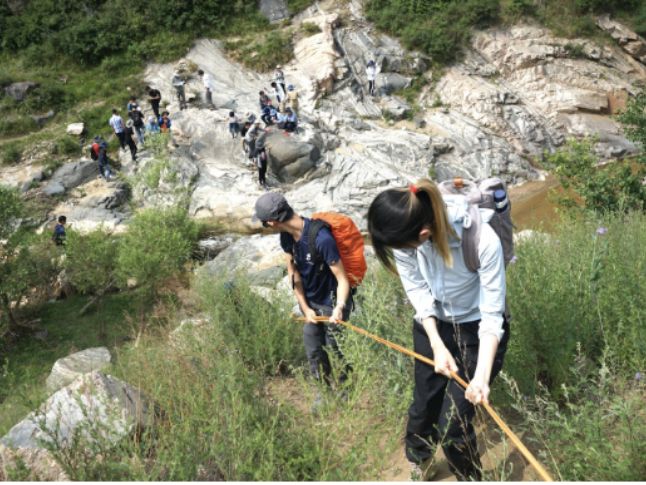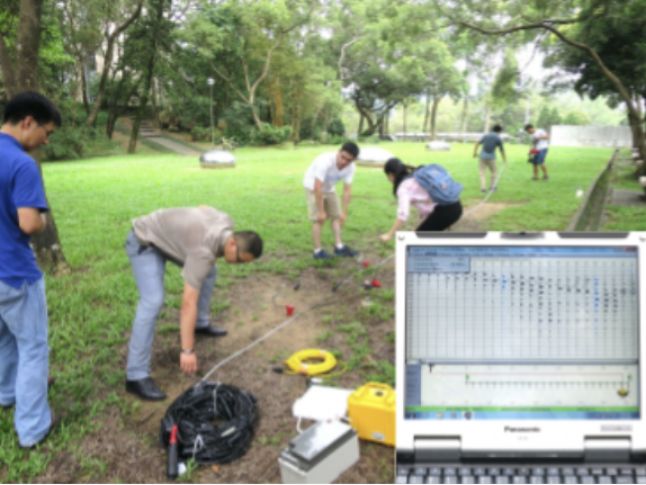Jump to:
Starting from 2022-23, new eligible students will be admitted into the integrated Earth and Environmental Sciences Programme instead of Earth System Science Programme.
Our Programme
The Earth and Environmental Sciences Programme, offered by Department of Earth and Environmental Sciences (EES), is for students interested in the scientific understanding of the interactions between the solid Earth, atmosphere, hydrosphere and biosphere. We study real-world problems affecting the Earth’s environment, such as global climate change, natural hazards and anthropogenic pollution through an interdisciplinary approach integrating applied physics, chemistry, biology, statistics, computation, machine learning and more. Our mission is to equip students with an in-depth scientific background and the latest technical skills to observe, identify, understand, analyse and address these critical problems.
Admission
You could become an EES student through:
JUPAS
- JS4648 Earth and Environmental Sciences
- JS4601 Science Board-based Admission Scheme
Non-JUPAS
- Local Applicants
- Mainland Gaokao Applicants
- Overseas Applicants
Please find more details in the following sections:
Admission: JUPAS
JUPAS applicants could become a EES student at CUHK through JS4648 or JS4601:
Earth and Environmental Sciences
(JUPAS Code: JS4648)
Subject 1*
Subject 2^
* One of the following subjects: Biology, Chemistry, Physics, Mathematics (Module 1 or 2), Geography and Combined Science
^ Any one subject in Category A.
Science – Broad-based Admission Scheme under the Faculty of Science
(JUPAS Code: JS4601)
Earth System Sciences Programme
(ESSC, JPUAS Code: 4633; up to 2021 Entry)
Transition of Earth System Science Programme: As of 2022, we have integrated the Earth System Science Programme with the Environmental Science Programme to form the new and comprehensive Earth and Environmental Sciences Programme.
Pathway to Become an EES Student through JUPAS
JS4648
Earth and Environmental Sciences
- Atmospheric Science Stream
- Geology and Geophysics Stream
- Environmental Science and Technology Stream
- General Earth and Environmental Sciences Stream
| DSE Subjects | Minimum Scores |
|---|---|
| Elective Subject 1 | Level 4 |
| English, Chinese, Maths, Elective Subject 2 | Level 3 |
| Citizenship and Social Development | (A) Attained |
Students can have an early start in
taking major courses!
EES Student
JS4601
Science Board-based Admission Scheme
| Time | Requirements |
|---|---|
| Beginning of Year 1 (Entry) | Level 5 or above in Biology or Chemistry or Physics or Combined Science or Mathematics (Module 1) or Mathematics (Modeule 2) |
| End of Year 1 | Grade C+ or above in CHEM1070 or CHEM1072 or LSCI1002 or LSCI1012 or MATH1010 or MATH1018 or MATH1520 or PHYS1001 or PHYS1002 or PHYS1111 or PHYS1113 or STAT1011 or STAT1012 |
| End of Year 2 | 1. Any ONE course from BIOL2210 / EESC2270 / EESC2515 / EESC2010 / EESC2020 / EESC2800, and 2. Any THREE courses from CHEM1070 / CHEM1072 / LSCI1002 / LSCI1012 / MATH1010 / MATH1018 / MATH1520 / PHYS1001 / PHYS1002 / PHYS1111 / PHYS1113 / STAT1011 / STAT1012 |
Admission: Non-JUPAS
Our Programme is also accepting Non-JUPAS applications. Please refer to the following link for more details.
FAQs
Earth and Environmental Sciences offers a flexible curriculum with options to specialize in the following streams:
• Atmospheric Science is the study of the physical and chemical processes governing the Earth’s atmosphere. It focuses on phenomena relevant to understanding weather, climate, and atmospheric composition, their variability and changes, and their interactions with the hydrosphere, geosphere, and biosphere.
• Geology and Geophysics is the study of the solid Earth, including its formation history, physical properties, and active processes, through the integration of remote sensing, seismic, field, and numerical modeling techniques.
• Environmental Science and Technology integrates fundamental concepts from chemistry and biology to address and mitigate environmental challenges. Our curriculum is accredited by the Hong Kong Institute of Qualified Environmental Professionals (HKIQEP).
In addition, core courses included in all streams, provide students with a solid scientific background and opportunities to engage in field and laboratory work. Our curriculum places particular emphasis on building students’ capabilities in quantitative and analytical skills, such as numerical modeling, programming, statistics, and data analysis.
EES offers experiential learning beyond the classroom, including exchange opportunities in overseas universities, and internships at the Hong Kong Observatory, Environmental Protection Department, Agriculture, Fisheries and Conservation Department, and other government agencies, geotechnical and environmental consulting firms, environmental organizations, and the educational sector. There are also ample opportunities to work closely with faculty in undergraduate research, seminars, and workshops.
The small class sizes of EES foster a close-knit atmosphere among teachers and students. They engage on a personal level, forming bonds that extend beyond the classroom. We also provide an extensive network of resources and opportunities as being part of the massive CUHK institution.
Prepare yourself with the essential skills to succeed across diverse professional paths and advanced technical fields in our EES programme. The breadth of material covered provides our graduates with an excellent foundation for jobs in the government, non-governmental organizations, and industry, including the following:
- Geotechnical survey and engineering
- Meteorological, marine, and climate services
- Climate, energy, and environmental consulting and management
- Environmental protection and conservation
- The educational sector
Employers include the Environmental Protection Department, the Hong Kong Observatory, Agriculture, Fisheries and Conservation Department, Ocean Park Hong Kong, Arup, AECOM, EGS, GeoRisk Solutions, Gammon, Tysan, Ambit Geospatial Solution, Cathay Pacific, CLP, Fugro, HKT, and more.
For those aiming to elevate their career trajectory, our programme provides sufficient depth to prepare graduates for graduate school in the earth and environmental sciences and related disciplines. We also have career workshops that equip individuals with essential skills and insights, and our programme can be adjusted to accommodate students with particular career goals in mind. We aim to shape well-rounded professionals, ready to shine in a dynamic world of endless opportunities.
Course Structure
(4-year BSc Programme in Earth and Environmental Sciences)
The EES Major adopts a three-layered curriculum structure that emphasizes the interdisciplinary nature of the programme. Students are required to complete 72 units of courses as follows:
|
Year 1-2 |
Foundation layer: an overview of Earth and Environmental Sciences, basic sciences and computing skills |
|
12 units |
|
Year 2-3 |
A group of courses on different focus areas of the Earth and Environmental Sciences, supplemented by a choice of supporting science courses |
|
14-15 units |
|
Year 3-4 |
A group electives, including upper-level Earth and Environmental Sciences and relevant courses from other programmes, plus a required capstone research project |
|
8-9 units |
|
Total: |
72 units |
- For details please check the major programme requirement from CUHK website
- Students are encouraged to check the major programme requirement from time to time because courses availability changes from time to time.
| Introductory Courses | Introductory Courses | Upper-Level Courses |
|---|---|---|
|
Introductory Courses
|
Introductory Courses
|
Upper-Level Courses
|
There are three streams available within the EES programme. Students will need to take courses according to the major programme requirement in order to be in one of the streams.
and Technology Stream
Science Stream
Geophysics Stream
Each EES student can choose one of the streams at any time during his or her study in CUHK.
Stream
The major programme requirement is different for different streams.
For General Stream,
| Major Programme Requirement | Units | ||
|---|---|---|---|
|
Major Programme Requirement Major |
Faculty Package |
12 |
Units 72 |
|
Major Required |
25-26 |
||
|
Major Elective |
32-36 |
||
For Atmospheric Science, Environmental Science and Technology, and Geology and Geophysics Streams,
| Major Programme Requirement | Units | ||
|---|---|---|---|
|
Major Programme Requirement Major |
Faculty Package |
12 |
Units 72 |
|
Major Required |
37-38 |
||
|
Major Elective |
22-24 |
||
- If students do not opt for one of the streams, they can remain in “General Stream” in EES.
- For details of each stream please check the major programme requirement from CUHK website
Students are required to complete a minimum of 20 units of courses as follows:
| Minor Programme Requirement | Units | ||
|---|---|---|---|
| 1 | Required Courses |
Three of the 2000-level designated Foundational EES courses |
9 |
| 2 | Electives | Three intermediate-level designated courses | 8-9 |
| One advanced-level designated course | 3 | ||
| Total: | 20 | ||
- This minor programme is not for students of ENSC and ESSC.
- For details please check the minor requirement from CUHK website
- The Minor Programme will be commenced in the academic year 2023-24. For enquiries, please contact the EES general office by email or by phone.
EES offers a flexible curriculum with options to specialize in different streams, course planning is important for new students. We provide academic counseling sessions for new students every year in August. Suggestions in study plans are provided during the session.
1. What are the differences between Earth and Environmental Sciences (EESC), Earth System Science Programme (ESSC) and Environmental Science (ENSC)?
EESC is the new integrated programme resulting from a merger between ESSC and ENSC. Each of ESSC and ENSC has had unique strengths and scopes catering to students of different needs and backgrounds, and the new EESC programme aims to combine such strengths such that students can be the most prepared to address the pressing environmental and resource problems of the 21st century. Starting from the academic year of 2022-23, new students entering CUHK can choose EESC as their major, but not ESSC or ENSC.
2. What is the advantage of being admitted through Earth and Environmental Sciences (JS4648)?
Students entering via the separate JUPAS will gain early exposure to the EES community, where they can enjoy not only more specific advice from teaching staff and peer mentors, but also early opportunities to EES-focused activities.
3. Will the existing internships and learning activities such as field trips in ENSC or ESSC be kept in the new programme EESC?
Yes, absolutely. By integrating existing opportunities into a combined programme, students across the board can enjoy an even wider range of learning activities.
4. I am a student admitted to CUHK before 2022, can I change major to EESC or declare minor in EESC?
No, you cannot change major to EESC or minor in EESC. Major or minor in EESC is only applicable to students admitted in 2022-23 and thereafter.
Phone: (852) 3943 9323
Email: eesc@cuhk.edu.hk








